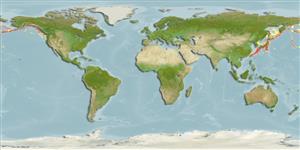Common names from other countries
Environment: milieu / climate zone / depth range / distribution range
Écologie
marin benthopélagique; profondeur 612 - 1700 m (Ref. 50550). Temperate; 66°N -
North Pacific: Pusan, Korea north (outside the Sea of Okhotsk) to Providence Bay in the Anadyr Gulf of the Bering Sea, throughout the Aleutian Basin and islands, and southeast to Mathieson Channel, British Columbia, Canada.
Taille / Poids / Âge
Maturity: Lm ? range ? - ? cm
Max length : 41.0 cm TL mâle / non sexé; (Ref. 56527); poids max. publié: 2.3 kg (Ref. 56527)
Description synthétique
Clés d'identification | Morphologie | Morphométrie
Épines dorsales (Total) : 0; Rayons mous dorsaux (Total) : 8 - 9; Épines anales: 0; Rayons mous anaux: 7 - 9. Brownish gray with dark spots dorsally, muddy gray ventrally. Caudal fin rounded; pectoral fins large and broadly based; pelvic fins modified to form a clinging disc with a thickened margin on the ventral surface of the body (Ref. 6885). Skin naked without scales and tubercles. First dorsal fin completely embedded under the skin. Disk rudimentary in young, well developed in adults (Ref. 43939).
Males are said to guard the eggs (Ref. 6885). Migrate to spawn in littoral waters of Bering Sea in December-June (Ref. 43939).
Life cycle and mating behavior
Maturities | Reproduction | Spawnings | Egg(s) | Fecundities | Larves
Eschmeyer, W.N., E.S. Herald and H. Hammann, 1983. A field guide to Pacific coast fishes of North America. Boston (MA, USA): Houghton Mifflin Company. xii+336 p. (Ref. 2850)
Statut dans la liste rouge de l'IUCN (Ref. 130435)
CITES (Ref. 128078)
Not Evaluated
Menace pour l'homme
Harmless
Utilisations par l'homme
Outils
Articles particuliers
Télécharger en XML
Sources Internet
Estimates based on models
Preferred temperature (Ref.
115969): 2.3 - 4.6, mean 2.8 (based on 159 cells).
Phylogenetic diversity index (Ref.
82804): PD
50 = 1.0000 [Uniqueness, from 0.5 = low to 2.0 = high].
Bayesian length-weight: a=0.01995 (0.00906 - 0.04395), b=3.01 (2.83 - 3.19), in cm Total Length, based on all LWR estimates for this body shape (Ref.
93245).
Niveau trophique (Ref.
69278): 3.7 ±0.38 se; based on food items.
Résilience (Ref.
120179): Milieu, temps minimum de doublement de population : 1,4 à 4,4 années (Preliminary K or Fecundity.).
Fishing Vulnerability (Ref.
59153): Low to moderate vulnerability (31 of 100).
